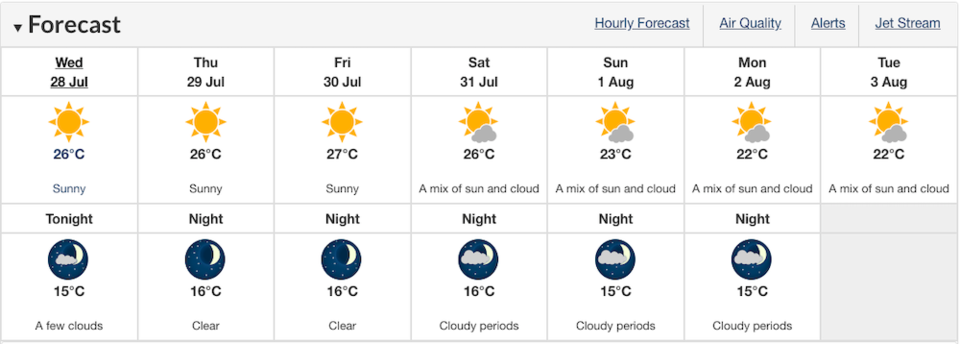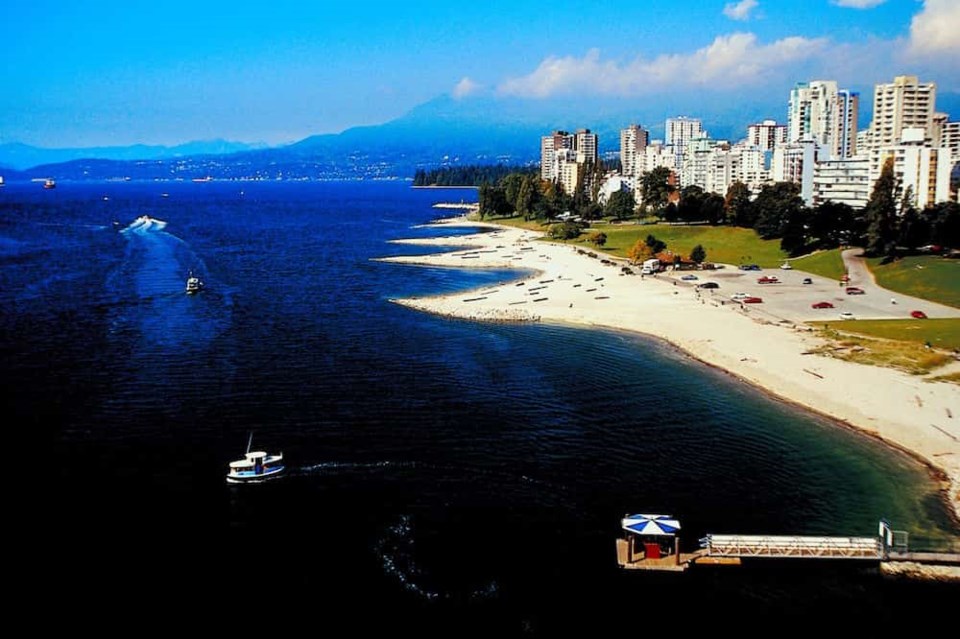The Vancouver Coastal and Fraser Health authorities are reminding residents to take precautions as temperatures increase in the Lower Mainland this week.
Environment Canada issued a heat warning Tuesday (July 27) that calls for daytime high temperatures near 30°C combined with overnight lows in the mid to upper teens.
A ridge of high pressure is expected to lead to rising temperatures on Thursday and into the weekend, explains the federal weather forecaster.
"Heat stress can pose an immediate danger to health. If you are experiencing any symptoms, it’s important to get out of the sun, find a cool location and hydrate,” said Dr. Emily Newhouse, Fraser Health Medical Health Officer.
”Remember to check in with older people who may begin to feel unwell as temperatures remain warm this week. You can help by checking if they are able to stay cool and calling for medical assistance if appropriate.”
According to the weekly forecast, Wednesday is expected to see bright sunshine and reach a high of 26°C on the coast and 29°C inland. With humidity, however, these temperatures will feel more like 30°C and 32°C respectively.
Thursday's forecast includes similar coastal temperatures but inland temperatures are expected to rise a couple of degrees to 31°C that will feel like 34°C with humidity.
Friday is expected to see temperatures climb to 27°C on the coast and 32°C inland; Saturday is expected to see similar daily highs, too.
Right now, Sunday's forecast includes a mix of sun and cloud and slightly cooler temperatures, with a high of 23°C on the coast and 28°C inland.
Metro Vancouver Weather Forecast
 Photo via Environment Canada
Photo via Environment CanadaCoping with the Metro Vancouver heat wave
There is a variety of mild to severe symptoms linked with heat-related illness, including thirst, dizziness, confusion, weakness and fainting or collapsing. Medical Health Officers remind Lower Mainland residents to take precautions to protect themselves and others from the heat, including:
Check-in on others
- People living alone are at high risk of severe heat related illness. Check regularly on older people, and those who are unable to leave their homes, for signs of heat-related illness.
- If others are unwell, help move them to a cool indoor or shady space, help them get hydrated and call for medical assistance if appropriate.
Stay hydrated
- Drink cool non-alcoholic beverages (preferably water) irrespective of your activity intake. Don’t wait until you are thirsty.
- If your doctor generally limits the amount of fluid you drink or has you on water pills, ask about increasing the amount of water you can drink while the weather is hot.
Keep cool
- Never leave children or pets alone in a parked car. Temperatures can rise to 52°C (125°F) within 20 minutes in an enclosed vehicle when the outside temperature is 34°C (93°F). Leaving the car windows slightly open or "cracked" will not keep the inside of the vehicle at a safe temperature.
- Seek out an air-conditioned facility (such as a shopping centre, library, community centre, restaurant, or a residence of friends or family).
- Use public splash pools, water parks or pools or take a cool bath or shower.
- At high temperatures, fans alone are not effective. Applying cool water mist or wet towels prior to sitting in front of a fan is a quick way to cool off.
- Dress for the weather by wearing loose, light-weight clothing. Protect yourself from the sun by wearing a wide-brimmed hat and sunglasses.
- Keep your home cool. Open windows, close shades, use an air conditioner (if you have one) and prepare meals that do not require an oven.
- Avoid sunburn, stay in the shade or use sunscreen with SPF 15 or more.
- Avoid tiring work or exercise in the heat. If you must exercise or conduct strenuous work, drink two to four glasses of non-alcoholic fluids each hour. Limit daytime outdoor activity to early morning and evening. Employers should consider delaying or modifying outdoor work during high heat, and providing for hydration and frequent cooling breaks following WorkSafeBC guidance when work continues.
For more information on heat-related illness, call HealthLink BC at 811.
Will there be another scorching hot heat wave in Metro Vancouver this summer?
While you might have to be prepared for more sweltering humidity, it isn't likely that B.C. will see the same scorching daily highs that it did during the heat wave at the end of June.
"That kinda thing is a once-in-a-lifetime event," Environment Canada meteorologist Doug Lundquist told Vancouver Is Awesome.
"Let's hope that doesn't happen [again] for decades."
Environment Canada calls for above-average temperatures across B.C. this summer but more information about August will be available later this month. Find out the full summer forecast and its possible heat waves.



